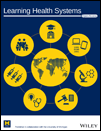
Frontiers in Digital Health
Scope & Guideline
Unlocking the Future of Healthcare with Digital Solutions
Introduction
Aims and Scopes
- Digital Health Interventions:
Research on the design, implementation, and evaluation of digital health interventions aimed at improving patient outcomes, behavior change, and health management. - Artificial Intelligence and Machine Learning:
Utilization of AI and machine learning techniques for predictive analytics, decision support systems, and automation in healthcare settings. - Telehealth and Remote Monitoring:
Exploration of telehealth services, remote patient monitoring technologies, and their impact on healthcare access, quality, and patient satisfaction. - Wearable Technologies:
Investigation into wearable devices and their applications in health monitoring, data collection, and enhancing physical activity and wellness. - Health Data Analytics:
Focus on the analysis of health data, including the use of big data and natural language processing to derive insights for clinical decision-making and research. - Behavioral Health and Digital Therapeutics:
Research dedicated to digital mental health solutions, including mobile apps and platforms that support mental health interventions and patient engagement. - Health Equity and Accessibility:
Studies addressing disparities in digital health access, with a focus on improving health outcomes for underserved populations.
Trending and Emerging
- Integrative Digital Health Models:
An increasing focus on integrative models that combine various digital health technologies, such as telehealth, wearables, and AI, to provide holistic patient care. - AI-Driven Personalized Medicine:
Emerging research on the application of AI in personalizing treatment plans and enhancing patient engagement through tailored digital interventions. - Mental Health Technologies:
A notable rise in studies exploring digital mental health technologies, including chatbots and mobile apps designed to address mental health challenges. - Blockchain in Healthcare:
Growing interest in the use of blockchain technology for securing health data, enhancing interoperability, and improving patient privacy. - Patient-Centric Design in Digital Health:
An emphasis on user-centered design principles in the development of digital health solutions, ensuring that technologies are accessible and meet user needs. - Data Privacy and Ethical Considerations:
Increasing attention to data privacy, security, and ethical implications of digital health technologies, particularly in the context of AI and big data.
Declining or Waning
- Traditional Health IT Systems:
Research focusing solely on traditional electronic health record systems is declining as interest shifts toward integrated digital health ecosystems and innovative solutions. - Basic Health Information Websites:
Studies centered on simple health information websites are becoming less frequent as more sophisticated, interactive, and user-centered digital health tools gain traction. - Single-Factor Health Interventions:
A decrease in research focused on interventions targeting single health issues, as there is a growing recognition of the need for multifaceted approaches in digital health. - In-Person Healthcare Models:
Research emphasizing conventional in-person healthcare models is waning, with a clear shift towards hybrid and fully digital care delivery models.
Similar Journals

JOURNAL OF MEDICAL INTERNET RESEARCH
Transforming Health Through Digital InnovationsJOURNAL OF MEDICAL INTERNET RESEARCH, published by JMIR PUBLICATIONS, INC, stands as a pivotal resource in the field of Health Informatics, with an esteemed ranking of #7 out of 138 in the Scopus database, placing it in the top 95th percentile. Since its inception in 1999, this Open Access journal has been committed to disseminating high-quality, peer-reviewed research that explores the intersection of healthcare and internet technologies. With its headquarters in Toronto, Canada, the journal encompasses a broad range of topics, including eHealth, telemedicine, and mobile health innovations. The impact factor and its Q1 quartile ranking highlight the journal's significant influence and prevalence in advancing the understanding of digital health landscapes. Researchers, professionals, and students alike benefit from its valuable insights, making the JOURNAL OF MEDICAL INTERNET RESEARCH an essential tool for fostering informed practices and policy-making in the rapidly evolving domain of health informatics.

JMIR Cancer
Connecting the dots in cancer research and patient care.JMIR Cancer is a premier open access journal published by JMIR Publications, Inc., dedicated to advancing the field of cancer research and oncology. Since its inception in 2015, the journal has become an invaluable resource for researchers, clinicians, and students alike, providing a platform for the dissemination of cutting-edge research and clinical insights. Operating out of Canada, JMIR Cancer holds noteworthy rankings, including a Q3 position in Cancer Research and Q2 in Oncology as of 2023, highlighting its significant contribution to the scientific community. With the journal's open access model, articles are made freely available, ensuring that vital research reaches a wide audience and fosters collaboration across disciplines. By focusing on innovative research, translational studies, and clinical practices related to cancer, JMIR Cancer aims to be at the forefront of knowledge translation and tumor biology, bridging the gap between laboratory findings and patient care.

Lancet Digital Health
Transforming Health Systems with Cutting-Edge Research.Lancet Digital Health is an esteemed Open Access journal published by ELSEVIER, dedicated to advancing the interdisciplinary field of digital health. Since its inception in 2019, the journal has rapidly established itself as a leading platform for disseminating high-quality research focusing on the implications of digital technology in healthcare delivery, health informatics, and patient management. Renowned for its rigorous peer-review process and commitment to academic excellence, Lancet Digital Health currently holds prestigious Q1 rankings across multiple categories including Decision Sciences, Health Informatics, and Medicine (miscellaneous) as of 2023. With an impressive impact in its field—ranked #1 in Health Informatics and within the top percentile of related disciplines—this journal offers vital insights into the ongoing transformations within health systems globally. Researchers, healthcare professionals, and students alike will find a wealth of cutting-edge studies, practical applications, and discussions on the future of digital health, fostering an evidence-based dialogue that is essential in today's rapidly evolving medical landscape.

JMIR mHealth and uHealth
Advancing Mobile Health for a Better TomorrowJMIR mHealth and uHealth is a leading peer-reviewed journal that focuses on the innovative aspects of mobile health (mHealth) and the utilization of technology in health care, published by JMIR Publications, Inc. Since its inception in 2013, this Open Access journal has rapidly established itself as a vital resource in the realm of health informatics, currently ranked #13 out of 138 in the Scopus category of Medicine - Health Informatics, placing it in the top 10th percentile. With a Q1 ranking in Health Informatics for 2023, it is recognized for its high-quality research contributions and significant impact in shaping the future of health technology. The journal serves as an essential platform for researchers, professionals, and students seeking to advance their understanding of how mobile solutions can enhance health outcomes and patient engagement. Accessible to a global audience, JMIR mHealth and uHealth aims to foster collaboration and innovation in the fields of mHealth and uHealth, encouraging the dissemination of research that transforms health care practices.

npj Digital Medicine
Advancing Health Solutions at the Intersection of Technologynpj Digital Medicine is a leading journal in the interdisciplinary landscape of digital health, published by NATURE PORTFOLIO. Since its inception in 2018, this open-access journal has rapidly established itself as a premier platform for innovative research and insights at the intersection of technology and healthcare. With an impressive impact factor and ranked in the Q1 category across multiple fields—including Computer Science Applications, Health Informatics, and Medicine—npj Digital Medicine represents the forefront of research aimed at revolutionizing patient care and healthcare delivery through digital advancements. The journal is positioned in the top percentiles of Scopus rankings, highlighting its vital role in shaping the future of medicine in an increasingly digital world. By providing a space for rigorous research and practical applications, npj Digital Medicine invites contributions from researchers, clinicians, and technologists eager to explore novel solutions to contemporary health challenges, ultimately enhancing patient outcomes on a global scale.

Wearable Technologies
Transforming Healthcare with Cutting-Edge Wearable ResearchWearable Technologies is an esteemed peer-reviewed journal published by CAMBRIDGE UNIV PRESS, focusing on the innovative intersection of technology and healthcare. Since its establishment in 2020, this Open Access journal has garnered significant recognition in the field of Biomedical Engineering, with a remarkable impact factor reflected in its top-tier rankings—Q1 in Biomedical Engineering and Rehabilitation, and Q2 in Human-Computer Interaction. Positioned as a leader in its domain, Wearable Technologies continually explores the advancements and applications of wearable devices, facilitating groundbreaking research that enhances user interaction and rehabilitation outcomes. With its robust Scopus rankings—including a 92nd percentile in Medicine Rehabilitation—this journal serves as an invaluable resource for researchers, professionals, and students keen on advancing the understanding and application of wearables in various fields. Based in Cambridge, United Kingdom, it aims to stimulate scholarly conversation and disseminate pivotal discoveries that shape the future of both technology and healthcare.

Biomedical Engineering and Computational Biology
Innovating at the Crossroads of Biology and EngineeringBiomedical Engineering and Computational Biology is a premier journal dedicated to advancing the fields of biomedical engineering and computational biology through rigorous research and innovation. Published by SAGE Publications Ltd, this Open Access journal has been providing a platform for the dissemination of high-quality research since 2009, enabling wider accessibility and collaboration among scientists and practitioners around the globe. With its comprehensive scope that encompasses the intersection of engineering principles and biological systems, the journal plays a critical role in fostering advancements in healthcare technologies and computational methods. Researchers, professionals, and students alike can take advantage of its rich repository of articles that contribute significantly to the understanding and application of complex biological data through computational techniques. The journal’s commitment to excellence is reflected in its high visibility within the scientific community, making it an essential resource for those looking to stay at the forefront of this dynamic field.

Learning Health Systems
Advancing healthcare through innovative insights.Learning Health Systems is a premier open access journal published by WILEY that has been at the forefront of innovation in the fields of Health Informatics, Health Information Management, and Public Health since its inception in 2016. With a dedicated focus on the intersection of clinical practice and health technology, this journal is pivotal for researchers, professionals, and students seeking to advance the knowledge base in these critical areas. The journal enjoys a robust reputation, boasting a Q1 ranking in multiple categories as of 2023, and ranking within the top percentiles in both Medicine and Health Professions across various metrics. Designed to foster collaboration and dissemination of cutting-edge research, Learning Health Systems is committed to bridging gaps between data science and practical health applications while providing an accessible platform for transformative ideas. It invites contributions that challenge existing paradigms and promote innovative solutions that enhance healthcare delivery and patient outcomes.

Cardiovascular Digital Health Journal
Exploring the Nexus of Digital Health and Cardiovascular WellnessCardiovascular Digital Health Journal is a premier publication dedicated to advancing the field of digital health technologies in cardiovascular care. Published by Elsevier, this journal is a vital resource for researchers, professionals, and students engaged in the exciting intersection of cardiovascular medicine and innovative digital solutions. With an ISSN of 2666-6936, the journal spans from 2020 to 2024 and is categorized in Q2 across prominent fields including Biomedical Engineering, Cardiology and Cardiovascular Medicine, and Critical Care and Intensive Care Medicine, reflecting its influential position in the academic community. Although currently not an open-access journal, it offers access through institutional subscriptions, enabling a broad reach for cutting-edge research. The Cardiovascular Digital Health Journal not only strives to disseminate high-quality studies but also aims to foster collaborative insights that propel the integration of digital health in cardiovascular practice, addressing the critical needs of health systems worldwide.

INFORMATION RESEARCH-AN INTERNATIONAL ELECTRONIC JOURNAL
Pioneering Insights for a Global Information Community.INFORMATION RESEARCH - AN INTERNATIONAL ELECTRONIC JOURNAL is a distinguished open-access journal published by the University of Sheffield's Department of Information Studies, situated in England. Since its inception in 1995, the journal has been at the forefront of disseminating research findings in the field of Library and Information Sciences, earning a commendable Q2 ranking in the category for 2023. With an ISSN of 1368-1613 and an E-ISSN of 1368-1613, it serves as a vital resource for scholars, practitioners, and students alike, providing a platform for innovative insights and engaging discussions. The journal accepts submissions from diverse perspectives related to the information research domain and contributes to the ongoing dialogue among academic professionals worldwide. With a Scopus ranking placing it at 150 out of 280 in its field, this publication underscores its importance in shaping the future of information studies while enabling wide accessibility to cutting-edge research.